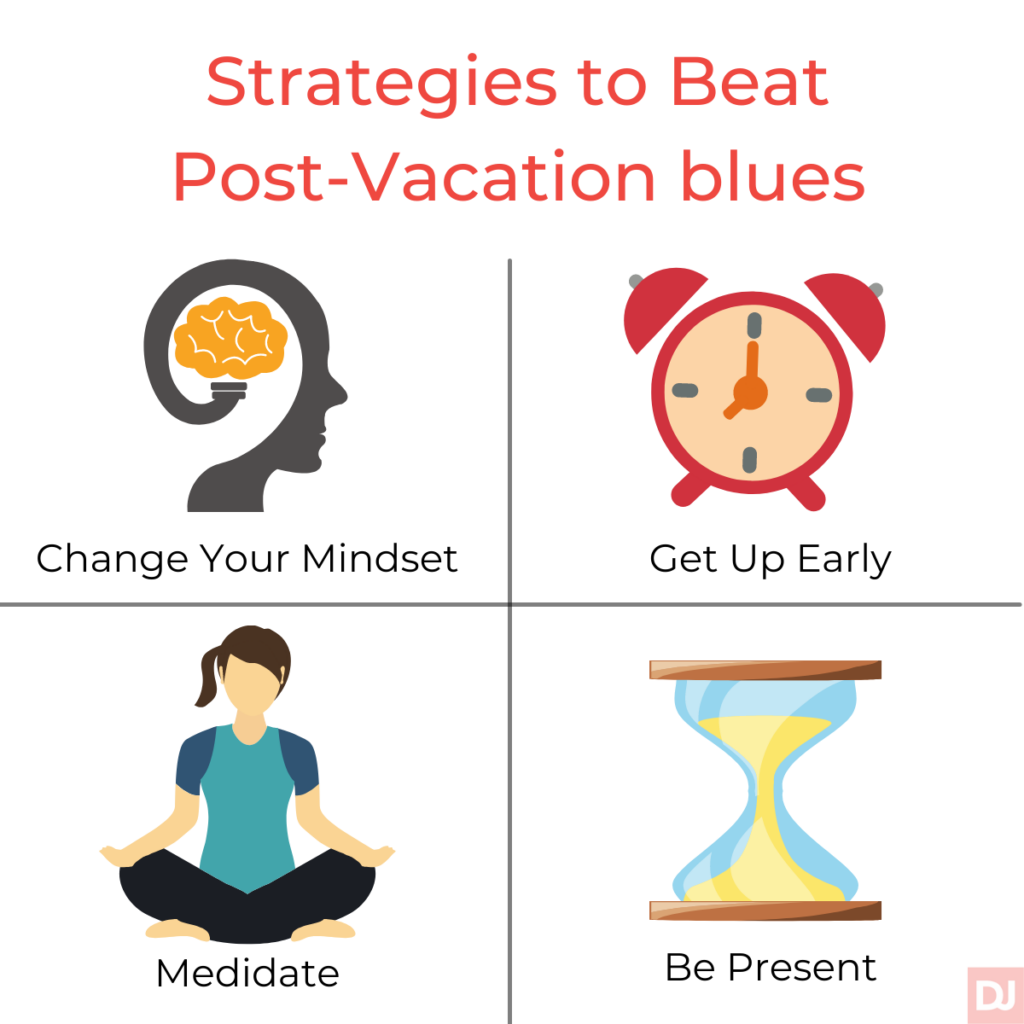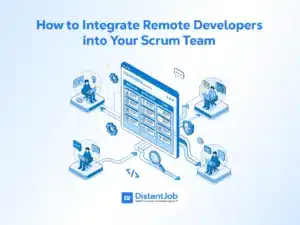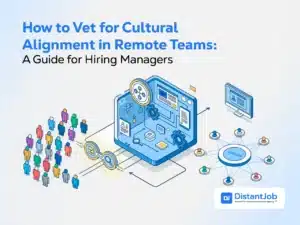You’re on the beach drinking margaritas, appreciating the golden rays of an outstanding sunset. Then suddenly, your fantasy vanishes, and you get back to reality: you’re not drinking margaritas, and you’re certainly not at the beach. You are on the first Zoom meeting after vacations, and depression and sadness have once again become your two new best friends. But don’t worry, although it feels horrible, you’re not alone. Most people experience the post-vacation blues during the first week (or weeks) when coming back to work.
Christmas tends to be one of the best times of the year for most people. You eat delicious food, spend quality time with your loved ones, do activities you usually don’t have time to do, and if it’s possible, you even visit another country or location to relax and enjoy. You forget about stress and work!
The problem is January.
January is a month full of hopes but also stress. You realize you’ve gained weight (I mean, who doesn’t?) and you’ve spent a lot of money on vacations. Also, you need to get back to work, which means funtime is over.
Most of you might’ve experienced the post-holiday blues, and they are almost a normal part of your work life.
In this article, Ihor Shcherbinin, DistantJob’s Director of Recruitment and the first man alive to beat post-vacation blues, shares 4 strategies to help you embrace coming back to work after Christmas (or any other holiday).
How to Beat the Post-vacation Blues
Post-vacation blues, also called post-travel depression (PTD), is a type of mood that persons returning home from a long trip (usually a vacation) may experience.
According to psychologists, although you might feel depressed, post-holiday blues is more a mood of loss than depression. What you have ‘’lost’’ is the high level and intensity of activities you did during vacation. Whether it was traveling, playing sports, or watching Netflix, when you suddenly need to get back to work, you experience a sudden letdown.
So, how to get your routine back after the holidays?
Ihor Shcherbinin tells us that all his life, he felt depressed when coming back to work. He felt with zero motivation, a bit confused with all the tasks and meetings. The worst part is that he loves his job, making these letdown feelings even more strange. Why would he feel that way if he loves his job and the people he worked with?
Well, the truth is that most people feel that way when returning to work. A survey conducted by the American Psychological Association found that 56% of respondents experience the most stress at work after coming back from a holiday.
Here are the top 4 strategies Ihor learned from his experience beating post-holiday blues:

#1: Change Your Mindset
Changing your mindset about how you feel regarding holidays is what makes a difference.
There’s a huge stereotype around what holidays are. When we were at school, we spent most of our year doing homework and attending classes. When it was summer, we had two months to do whatever we wanted. It was the best feeling ever. But suddenly, those two months passed by, and we needed to get back to school – these were our first experiences of post-holiday blues.
Most of us feel that holidays are a time to forget about our obligations and have fun. Whether fun for you means traveling the world or spending time at home with your kids playing board games. So, when we get back to work, we can’t do those things anymore because it’s all about work!
If we keep going through that cycle of holidays = fun and work = responsibilities and stress, we can never overcome post-holiday blues. The first step is to stop thinking that you can’t have fun just because of work, or you can’t do the things you enjoy.
You can do the activities you love the most, such as playing football, cooking, and still accomplishing your 8-hour schedule at work.
Work doesn’t take your entire day, so stop thinking you’ll be able to do these activities during the next holiday. The only thing preventing you from having fun, enjoying things, and being more relaxed, is you! It sounds crazy but changing our mindset and prioritizing our mental health will help us lead a more balanced life.
Tip: Schedule time for fun.
#2: Be an Early Bird
For some people, this is not a problem at all. They can get up as soon as the alarm sounds, get a shower, eat breakfast, and start their day. For others, getting up early is torture. They not only have to put 20 alarms hoping that one of them works, but they also need to drink like 3 cups of intense coffee to be truly awake.
It might sound nearly impossible getting early after vacations but think about it this way. When you wake up early – for example, at 7 am – you have a lot of time to do many things. You can do exercise, cook, work, and do an activity you like.
If you wake up late, you’ll feel you only have time to eat and work because otherwise, you won’t get all your tasks done. You won’t consider having fun because of your sense of responsibility, making the post-vacation blues feel even more intense.
Tip: Start waking early gradually. If you usually wake up at 9, try waking up at 8:45, the next day at 8:30 am, and so on until you reach the hour you feel you’ll be able to work and do other activities.
Being an early bird means forgetting about your inner night owl and getting the right amount of sleep (7-8 hours).
#3: Meditate
Meditation has been gaining a lot of buzz during these past years, and for a good reason. There are different reasons people do it, but most do feel different after making meditation a routine. Here are some of the benefits of meditation:
- Gaining a new perspective on stressful situations
- Building skills to manage your stress
- Increasing self-awareness
- Focusing on the present
- Reducing negative emotions
- Increasing imagination and creativity
- Increasing patience and tolerance
Ihor shared that overcoming post-vacation blues was possible also because of meditation. He had started meditating about two months ago, even before the holidays, but he didn’t do it every day. After the holidays, he started doing it every day as soon as he woke up, and it helped him change his mindset and to feel more connected to himself and his thoughts.
After doing it during the first week, he stopped feeling the gap between vacation happiness and work unhappiness. He managed to balance both feelings, adding up the strategies above.
Tip: If you have no experience with meditation, use apps such as Calm or Waking Up with guided meditations and sounds to get in tune with yourself.
#4: Be Present
Post-holiday blues occur mainly when we are disconnected from our present. We feel sad or ‘’depressed’’ because we are thinking about all the fun we were having on vacations. We are experiencing our past again and again instead of embracing our present.
‘’People are calculating how many days are until Friday, and the rest of the week is a nightmare for them. The importance is to be here and now. Appreciate every activity. Be 100% in what you’re currently doing. Stop Running. Stop skipping your days. Stop skipping your life.’’
Ihor Shcherbinin
If you’re in a meeting room in the office or in a remote team meeting via Zoom, be there. Listen to your coworkers, discuss ideas, share your thoughts. If you’re working on writing an important document, do it the best way you can. If you’re cutting a piece of paper, cut it the best way possible.
Tip: Ihor recommended a book called Awakening your Ikigai by Ken Mogi to help those who want to be connected with their present and get the most out of each day.
Final Word on Post-Vacation Blues
Post-vacation blues are a real thing for most people, even those like Ihor, who love their job and the people who work with him.
But imagine not having the right team by your side. It just extends the post-vacation blues into a permanent thing because working with employees who don’t understand your culture and how you do things gets frustrating and stressful.
If you’re looking to expand your team with talented techies and have no idea where to start, let us help you. We’re a remote recruitment agency that helps companies find their perfect IT match in less than two weeks.




